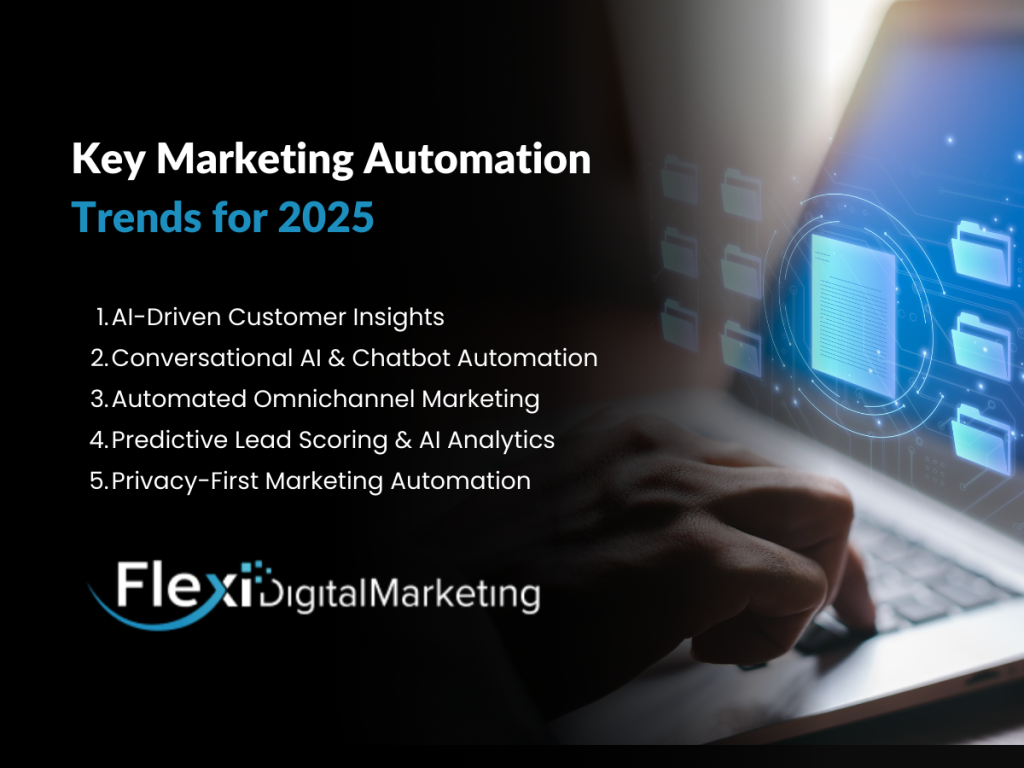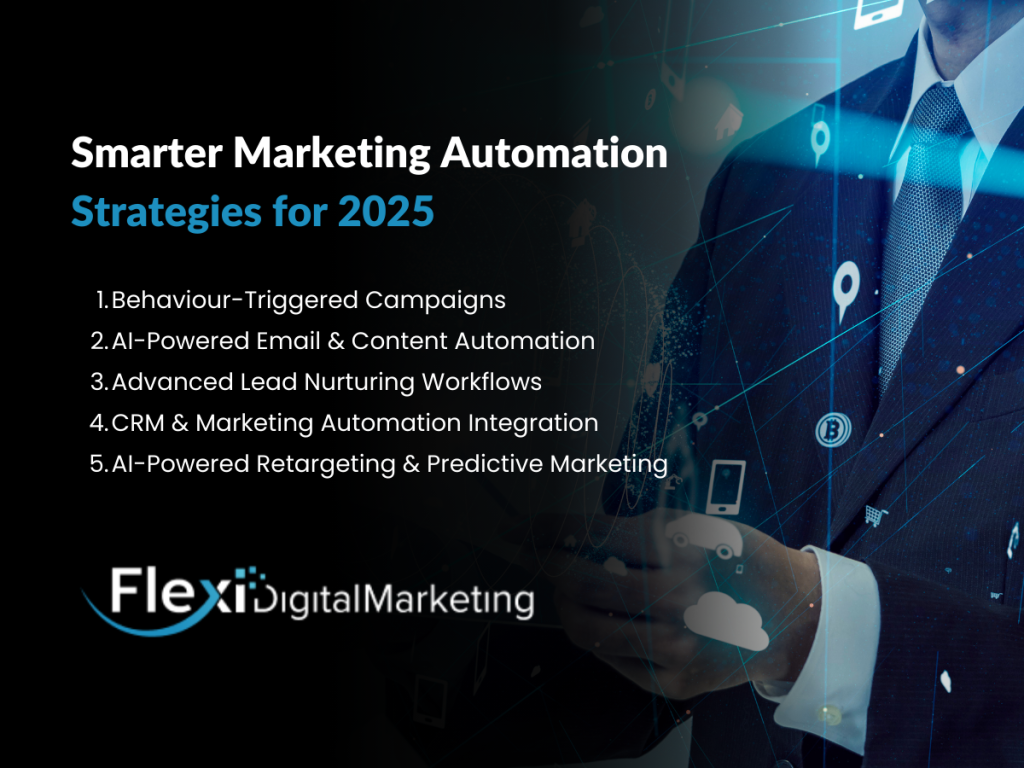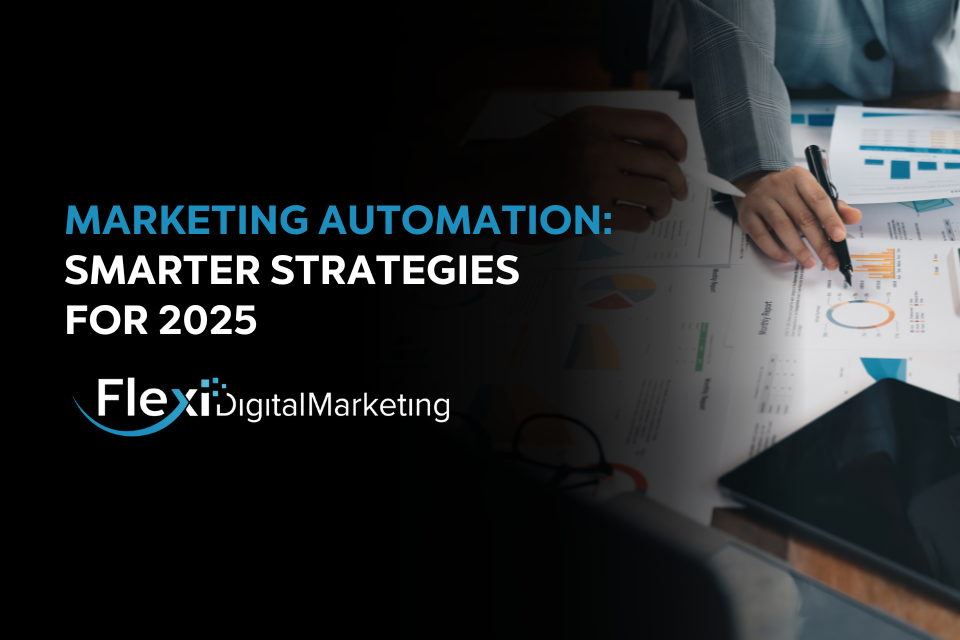Marketing automation has revolutionised the way businesses engage with their customers, allowing them to streamline operations, increase efficiency, and boost customer satisfaction. In 2025, marketing automation will evolve further, integrating AI, predictive analytics, omnichannel strategies, and privacy-first approaches.
With the rapid changes in consumer behaviour and stricter data regulations, businesses must adopt smarter automation strategies to stay ahead of the competition. This article explores the key trends, benefits, challenges, and best practices for marketing automation in 2025.
What is Marketing Automation?
Marketing automation helps businesses streamline repetitive tasks, improve efficiency, and personalise customer interactions across multiple channels. It enables companies to optimise marketing efforts and drive better results with these automated workflows:
- Send Automated Emails Based on User Actions: Businesses schedule and trigger emails when customers sign up, make purchases, or abandon shopping carts, ensuring timely and relevant communication.
- Segment & Nurture Leads Based on Behaviour: Marketers analyse customer interactions, segment prospects based on their interests, and deliver personalised content marketing strategies to boost engagement and conversion rates.
- Manage & Publish Social Media Content: Companies schedule and automate posts across platforms like Facebook, LinkedIn, and Instagram to maintain consistent brand presence and audience engagement.
- Engage & Retarget Customers with Personalised Messages: Businesses send tailored messages via email, SMS, and chatbots to re-engage customers, drive repeat purchases, and recover abandoned carts.
- Track & Analyse Marketing Performance: Automation tools monitor key metrics, generate performance reports, and refine marketing strategies to maximise return on investment (ROI).
Automating these tasks allows businesses to save time by reducing manual workload and focusing on strategic growth. It enhances personalisation by delivering relevant content based on customer behaviour, boosting engagement through consistent interactions across multiple platforms. Additionally, automation increases conversions by nurturing leads and building strong customer relationships while ensuring compliance by managing data responsibly and adhering to privacy regulations.
Why Does Marketing Automation Matter?
Marketing automation has become essential for businesses that want to scale, improve customer experiences, and stay ahead of the competition. It plays a crucial role to:
- Increase Efficiency & Productivity: Automation reduces repetitive tasks, allowing teams to focus on creative and strategic activities. Businesses execute campaigns faster and improve productivity.
- Deliver AI-Powered Personalisation: Customers expect brands to tailor their experiences. AI-driven automation enables businesses to deliver highly personalised content in real time, boost engagement and increase conversions.
- Ensure Seamless Omnichannel Engagement: Customers interact with brands across multiple digital platforms, and a strong social media community plays a key role in this engagement.
- Make Data-Driven Marketing Decisions: Automation tools generate real-time insights into customer behaviour and campaign performance. Businesses use these insights to refine strategies, improve ROI, and make smarter marketing decisions.
- Manage Data Responsibly & Stay Compliant: With stricter data privacy laws and the decline of third-party cookies, businesses must collect and manage first-party data ethically. Marketing automation ensures compliance while maintaining effective customer engagement.
Key Marketing Automation Trends for 2025
Businesses use more sophisticated marketing automation to enhance customer experiences, improve efficiency, and drive better results. Here are the key trends shaping the future of marketing automation:

AI-Driven Customer Insights
AI-powered automation will provide real-time customer insights, allowing businesses to:
- Analyse customer behaviour and predict future actions
- Optimise marketing campaigns with data-driven recommendations
- Personalise content and offers based on real-time interactions
Conversational AI and Chatbot Automation
Chatbots in Marketing are evolving to be more intelligent and human-like, enabling businesses to enhance customer engagement, streamline interactions, and deliver personalised experiences.
- Enhance customer support with AI-driven responses
- Engage prospects in real-time with automated chat solutions
- Qualify leads instantly and guide them through the sales funnel
Automated Omnichannel Marketing
Marketing automation will ensure a seamless customer journey across various channels, including:
- Email: Automated drip campaigns and triggered emails
- Social media: Scheduled posts and AI-powered recommendations
- SMS and messaging apps: Personalised updates and promotions
Predictive Lead Scoring and AI Analytics
AI-driven lead scoring will help businesses:
- Identify high-value leads based on engagement patterns
- Optimise conversion strategies with predictive analytics
- Allocate resources efficiently by focusing on promising prospects
Privacy-First Marketing Automation
With privacy laws becoming stricter, marketing automation must prioritise:
- First-party data collection through ethical means
- Consent-based marketing to build trust with customers
- Secure data storage and management to ensure compliance
Smarter Marketing Automation Strategies for 2025
As technology advances, businesses must refine their marketing automation strategies to stay competitive. These smart automation techniques enhance engagement, improve conversions, and optimise marketing efforts:

Behaviour-Triggered Campaigns
Rather than sending generic messages, businesses should implement triggered automation based on user actions, such as:
- Cart abandonment reminders sent within an hour
- Re-engagement emails for inactive subscribers
- Personalised recommendations based on browsing history
AI-Powered Email and Content Automation
AI-driven automation will optimise email marketing strategies by:
- Testing subject lines, content, and CTAs for better engagement
- Segmenting audiences based on their behaviour and preferences
- Delivering dynamic content tailored to individual recipients
Advanced Lead Nurturing Workflows
Automated lead nurturing campaigns will:
- Guide leads through the buyer’s journey with relevant content
- Score leads dynamically based on their engagement levels
- Retarget potential customers with personalised follow-ups
CRM & Marketing Automation Integration
Integrating marketing automation with CRM software ensures:
- A unified view of customer interactions across all touchpoints
- Seamless lead handover from marketing to sales teams
- Better data-driven decision-making for personalised marketing
AI-Powered Retargeting & Predictive Marketing
AI will revolutionise retargeting by:
- Analysing user interactions to deliver highly relevant ads
- Predicting customer needs and recommending products accordingly
- Optimising ad spend by focusing on high-intent prospects
Overcoming Challenges in Marketing Automation
Marketing automation offers significant advantages, but to maximise its benefits, businesses must address these key challenges:
- Ensure Data Privacy & Compliance: Strict regulations like CCPA and GDPR require businesses to be transparent about data collection and usage. Companies must implement consent-based marketing, secure customer information with encryption, and follow ethical data-handling practices to maintain compliance and customer trust.
- Avoid Over-Automation: Excessive automation can make interactions feel robotic and impersonal. Businesses should balance automation with human engagement, personalise content instead of sending generic automated messages, and monitor campaign performance to avoid overwhelming audiences.
- Integrate with Existing Systems: For seamless automation, businesses need tools that work well with CRM, sales, and analytics platforms. Ensuring compatibility, leveraging API integrations, and thoroughly testing workflows before deployment prevent inefficiencies and technical issues.
- Measure ROI & Effectiveness: To evaluate success, businesses must track key performance indicators (KPIs) such as open rates, conversions, and engagement levels. A/B testing helps refine automation workflows, while ongoing performance analysis ensures strategies remain effective and aligned with business goals.
- Maintain Data Quality & Accuracy: Automation relies on accurate data to deliver relevant messages and insights. Inconsistent, outdated, or incorrect data can reduce effectiveness and lead to missed opportunities. Businesses must implement data-cleaning processes, standardise data entry, and regularly audit databases to ensure high-quality customer information.
Best Practices for Implementing Marketing Automation
To maximise the impact of marketing automation, businesses must adopt these strategic approaches to enhance efficiency, strengthen customer relationships, and drive long-term growth:
- Define Clear Objectives: Successful automation begins with clear goals for lead generation, conversions, and customer engagement. Identifying key touchpoints where automation can enhance experiences and developing a structured roadmap ensures smooth implementation.
- Prioritise Personalisation: AI-driven insights allow businesses to tailor messages and offers based on customer behaviour, preferences, and demographics. Segmenting audiences and delivering dynamic content ensures more relevant and impactful communication.
- Align Marketing & Sales Teams: Collaboration between marketing and sales creates a seamless lead-nurturing process. Shared access to customer data improves personalisation, while quick responses to inquiries help increase conversion rates and customer satisfaction.
- Optimise Automation Workflows Regularly: Automation strategies must evolve with business needs. Monitoring campaign performance, refining workflows based on customer feedback, and testing new sequences improve efficiency and overall effectiveness.
- Stay Updated with Industry Trends: Marketing technology is constantly evolving, with AI advancements, privacy laws, and new automation features shaping the landscape. Keeping up with industry trends, adopting innovative tools, and attending conferences help businesses stay ahead of the competition.
Conclusion
AI-driven, data-conscious, and customer-centric marketing automation empowers businesses to streamline operations, deliver highly personalised experiences, and maximise marketing ROI. Companies that adopt smarter automation strategies strengthen customer relationships, enhance efficiency, and stay ahead in a rapidly evolving digital landscape.
Optimise your marketing automation today and unlock new growth opportunities. Contact us now to future-proof your marketing efforts!


